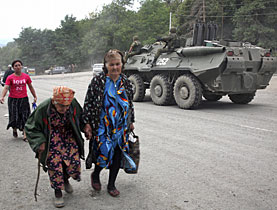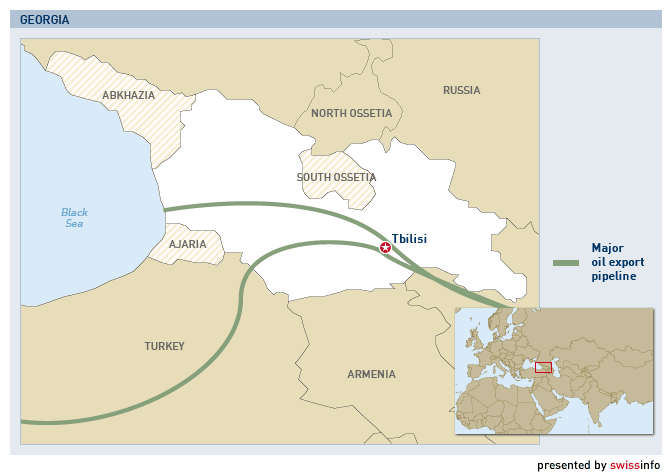
“Russia teaches Georgia a hard lesson”

Three days after attempting to retake the breakaway region of South Ossetia, Georgia has notified Russia of its withdrawal from the conflict zone.
Swiss expert on the Caucasus Jeronim Perovic told swissinfo that Russia wanted to demonstrate that it was in control in the region. He said Switzerland should play a role after peace is restored.
Russia poured troops and tanks across its southern border into Georgia and bombed Georgian targets after Tbilisi attempted on Thursday evening to retake South Ossetia, a small pro-Russian province.
The rapidly escalating crisis alarmed the United States, Georgia’s main ally and brought condemnation from the UN, Nato, and EU leaders.
“Russia has not only retaken South Ossetia – its protectorate inhabited by its citizens – but is also making Georgia pay by bombing Georgian territory. This is to teach them a very hard lesson on who is the master in this region,” Perovic said.
“It is also a signal to the US and other countries who is in charge in this region,” the senior researcher at Basel University added. Georgia has now expressed its readiness to start negotiations with its northern neighbour while Russia has also declared itself ready to make peace.
High cost
Perovic predicted that Georgia’s latest attempt to take control of South Ossetia would ultimately cost it this region and the other separatist region to the west, Abkhazia.
“By trying to reintegrate South Ossetia by force, Mikhail Saakashvili [Georgian president] will most likely lose these two territories once and for all.”
The domination of South Ossetia has been a long-standing goal of the Georgian president, according to Perovic. “Saakashvili declared when he became president in 2004 that his aim was to re-establish territorial integrity of the country.”
Switzerland should play a role in the post-conflict negotiations, as it is still highly regarded as a neutral nation by both ex-Soviet countries, Perovic suggested.
“Now is not the time for Switzerland to intervene but once the war is over and people have to sit together and talk Switzerland should try to offer a framework or a place for these parties to meet.”
The Swiss military observers and police advisors who are currently based in Georgia will remain in their posts. There is one Swiss stationed on each side of the Georgian-Abkhaz border where hostilities also flared up on Sunday.
In all six Swiss are stationed in Georgia under the command of the UN, but two are currently out of the country on leave. The UN mission for Georgia (Unomig) has been in place since 1993 with a force of 400.
Civilians at risk
UN High Commissioner for Refugees Antonio Guterres expressed grave concern on Sunday over the plight of thousands of civilians caught up in fighting in and around South Ossetia, a region of 70,000 people.
“It is essential that humanitarian agencies be able to reach the affected and the displaced, and that those trapped in conflict areas be granted passage to safer areas as soon as possible,” he said in a statement.
Russia’s response to the Georgian move has been swift and wide reaching. The Russian navy also entered the conflict, deploying a small group of ships off Georgia’s Black Sea coast. The Russian Interfax news agency said they would prevent weapons and military equipment reaching Georgia by sea.
“It’s not that Russia was looking for a pretext to do this,” Perovic observed. “They were surprised by Georgia starting a full-scale aggression in South Ossetia but now they want to finish their mission.”
swissinfo with agencies
The pro-Moscow enclave of South Ossetia in the Caucasus broke from Georgia as the Soviet Union split apart in the 1990s, but has no international status.
Georgia began a new offensive to regain control over South Ossetia on Thursday evening, launching heavy rocket and artillery fire and air strikes.
In response, Russia, which has granted passports to most South Ossetians, launched overwhelming artillery shelling and air attacks on Georgian troops.
Russian Deputy Foreign Minister Grigory Karasin said more than 2,000 people had been killed in the province since Friday but Georgia claims the death toll is much lower.
The UNHCR estimated the number of those displaced in Georgia proper and South Ossetia to be between 10,000 and 20,000.
Switzerland, which has 29 citizens in Georgia – 26 of them in Tbilisi – has not yet taken a decision to evacuate.
Several European countries have either asked their citizens to leave Georgia or are arranging evacuation.
Swiss travellers are advised to avoid the country as long as the situation remains unclear.


In compliance with the JTI standards
More: SWI swissinfo.ch certified by the Journalism Trust Initiative




























You can find an overview of ongoing debates with our journalists here . Please join us!
If you want to start a conversation about a topic raised in this article or want to report factual errors, email us at english@swissinfo.ch.